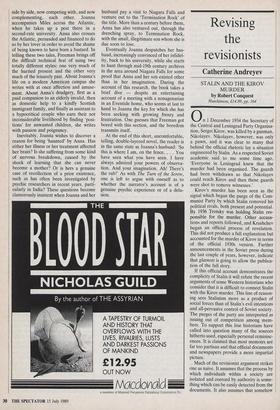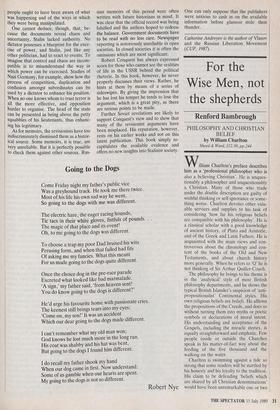Revising the revisionists
Catherine Andreyev
STALIN AND THE KIROV MURDER by Robert Conquest
Hutchinson, f14.89, pp. 164
0 n 1 December 1934 the Secretary of the Central and Leningrad Party Organisa- tion, Sergei Kirov, was killed by a gunman, Nikolayev. Nikolayev, however, was only a pawn, and it was clear to many that behind the official rhetoric lay a situation engineered by Stalin. As a respected Soviet academic said to me some time ago, `Everyone in Leningrad knew that the murder had been organised. The guards had been withdrawn so that Nikolayev could reach Kirov and then those guards were shot to remove witnesses.'
Kirov's murder has been seen as the signal which began the purge of the Com- munist Party by which Stalin removed his political rivals, both present and potential. By 1936 Trotsky was holding Stalin res- ponsible for the murder. Other accusa- tions and reports followed, and Krushchev began an official process of revelation. This did not produce a full explanation but accounted for the murder of Kirov in terms of the official 1930s version. Further announcements in the Soviet press during the last couple of years, however, indicate that glasnost is going to allow the publica- tion of the full story.
If this official account demonstrates the complicity of Stalin it will refute the recent arguments of some Western historians who consider that it is difficult to connect Stalin with the Kirov murder. This line of reason- ing sees Stalinism more as a product of social forces than of Stalin's evil intentions and all-pervasive control of Soviet society. The purges of the party are interpreted as issuing out of competition among mem- bers. To support this line historians have called into question many of the sources hitherto used, especially personal reminisc- ences. It is claimed that most memoirs are far too partisan and that official documents and newspapers provide a more impartial picture.
Much of the revisionist argument strikes one as naive. It assumes that the process by which individuals within a society are isolated and coerced by authority is some- thing which can be easily detected from the documents. It also assumes that somehow
people ought to have been aware of what was happening and of the ways in which they were being manipulated.
One cannot deduce, though, that, be- cause the documents reveal chaos and uncertainty, Stalin lacked authority. No dictator possesses a blueprint for the exer- cise of power, and Stalin, just like any other politician, had to react to events. To Imagine that control and chaos are incom- patible is to misunderstand the way in which power can be exercised. Studies of Nazi Germany, for example, show how the process of competition, duplication and confusion amongst subordinates can be used by a dictator to enhance his position. When no one knows whom to trust terror is all the more effective, and opposition harder to organise. The head of the state can be presented as being above the petty squabbles of his lieutenants, thus enhanc- ing his legitimacy.
As for memoirs, the revisionists have too indiscriminately dismissed them as a histor- ical source. Some memoirs, it is true, are very unreliable. But it is perfectly possible to check them against other sources. Rus-
Sian memoirs of this period were often written with future historians in mind. It was clear that the official record was being falsified and the authors hoped to redress the balance. Government documents have to be read with no less care. Newspaper reporting is notoriously unreliable in open societies. In closed societies it is often the omissions which are most significant.
Robert Conquest has always expressed scorn for those who cannot see the realities of life in the USSR behind the political rhetoric. In this book, however, he never properly discusses their views. Rather, he hints at them by means of a series of sideswipes. By giving the impression that he has lost his temper he tends to lose the argument, which is a great pity, as there are serious points to be made. Further Soviet revelations are likely to support Conquest's view and to show that many of the revisionist arguments have been misplaced. His reputation, however, rests on his earlier works and not on this latest publication. This book simply re- capitulates the available evidence and offers no new insights into Stalinist society. One can only suppose that the publishers were anxious to cash in on the available information before glasnost stole their thunder.
Catherine Andreyev is the author of Vlasov and the Russian Liberation Movement (CUP, 1987). •



















































 Previous page
Previous page